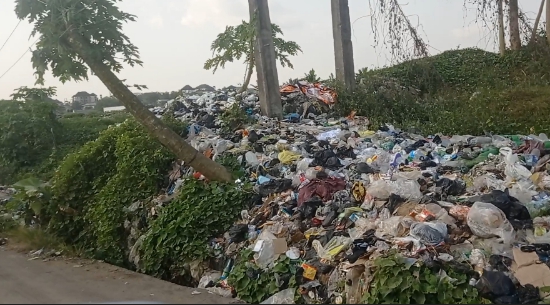Like in many other cities in Nigeria, the streets of Calabar in Cross River State, South-South Nigeria, are often littered with “dutty,” as garbage is commonly called in Nigerian pidgin.
These municipal solid waste primarily consists of everyday items that we use and discard, such as plastic bags and bottles, rags, and old newspapers.
In a metropolis once known for its clean and green environment, it is now quite common to see waste on waterways, roads, pedestrian walkways and around public spaces.
Nigeria is the ninth-highest contributor to plastic pollution globally, producing around 2.5 million tonnes of plastic garbage each year. Unfortunately, about 88 percent of the nation’s plastic garbage are not recycled; a large portion finds its way into rivers, lakes, lagoons, and the ocean.
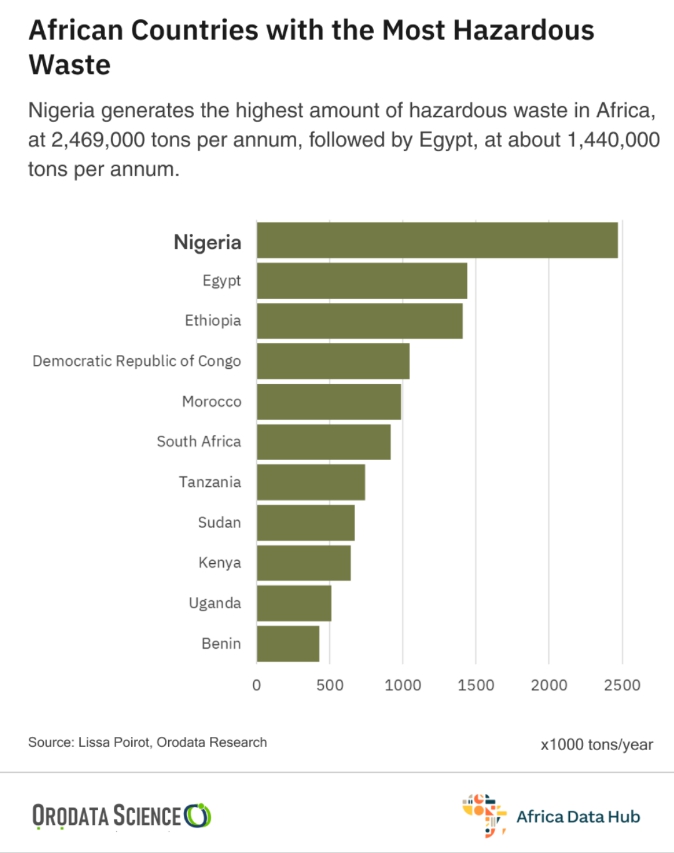
Sadly, plastic is not the only dutty seen in Calabar’s highly populated areas. Human waste from hospitals, debris from construction sites, and disposable plastic plates and spoons from restaurants, recreational centers are some other contributors to the heaps of waste.
When municipal solid wastes are not properly disposed, they lead to contamination. This is especially true in highly populated areas in the city where functional system of wastes collection is lacking.
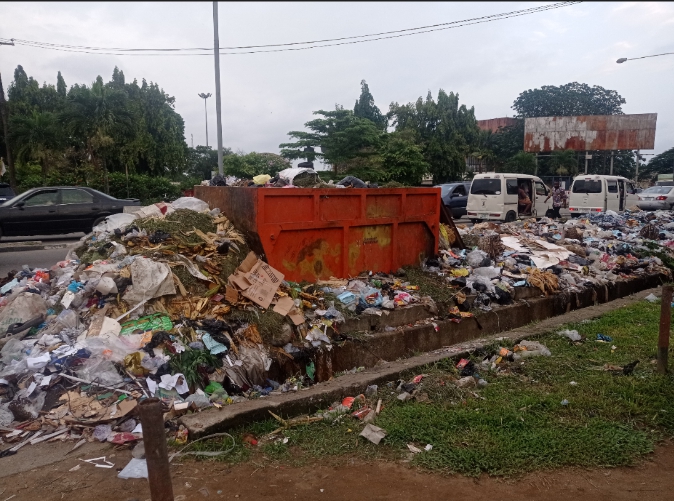
In other parts of the city, where privileged people live in affluence, including the streets that are part of the 12-kilometre carnival route for Africa’s biggest street party, the government pays better attention to waste management.
But Lemna community and other badly hit parts of the state often have to cohabit with heaps of smelling rubbish.
Robbing Peter to Pay Paul
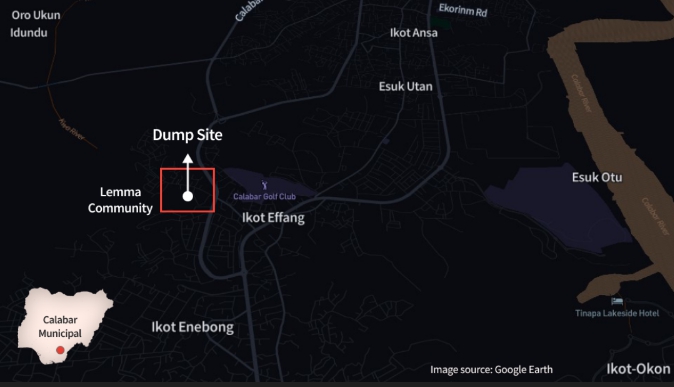
Lemna, a thriving quiet industrial and residential area with a beautiful landscape and state-of –the-art architectural pieces, is also home to mountain of waste, which have exposed residents to potential contamination. The stench from rotten food and other refuse is sickening and overbearing.
A dumpsite located at the entrance of the community is used by the Calabar Municipal Council for all waste generated in the Metropolis.
This means, the small community bears the full brunt of all the waste generated daily in the entire city.
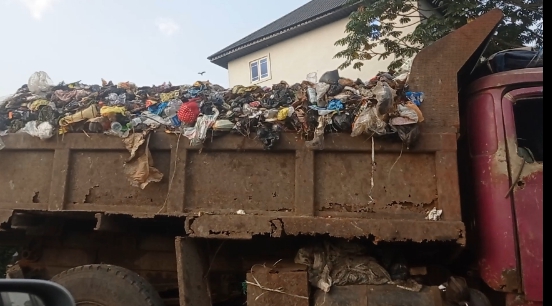
Daily, several trucks deliver loads of household and industrial waste from different parts of the city to the dumpsite.
From loud noises from faulty trucks to swarms of flies, rodents and an offensive smell described as a combination of ammonia and rotten eggs, residents struggle daily with the effects of poor waste disposal.
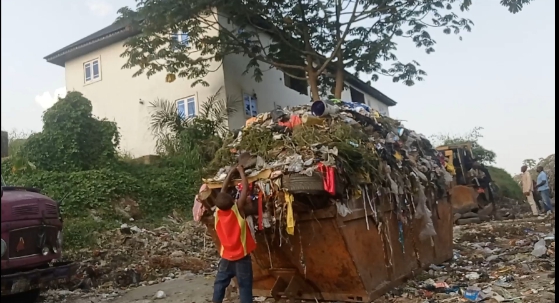
Even before the covid-19 pandemic, most residents wore makeshift nose masks to protect themselves from air pollution.
The life-threatening effects
Living in an area like Lemna is unhealthy for humans. In the study titled, “Environmental and Public Health Aspects of Solid Waste Management at the Lemna Dumpsite in Calabar, CRS, Nigeria,” I.U Bassey et al concluded that
“The open dumpsite poses serious health risk and destruction of biodiversity in both terrestrial and aquatic ecosystems of the area thus constituting good channels for disease transmission by flies, mosquitoes and rats.”
The World Health Organization (WHO), in “A Compendium of Guidance on Health and Environment,” posits that improper waste disposal can lead to adverse outcomes, through water, soil, and air contamination.
It added that unsafe waste treatment such as open burning can directly harm waste workers and other people in the community and that odors from landfill sites, and their physical appearance affect the lives of nearby residents by threatening their health and undermining their livelihoods and lowering property values.
In a recent interview carried out by GuardPost to test the hypothesis that the deposition of waste landfills has an impact on the surrounding environment, some health facilities were visited in Lemna and in Akai Effa community, a few kilometers away from Lemna.
The interviews with the doctors and pharmacists in these health facilities revealed that residents close to the dumpsite were more vulnerable to diseases like malaria, typhoid, cholera, skin disorders and food poisoning as deducted from the number of persons who report to their facilities for diagnosis and treatment.
On the other hand, residents in Akai Effa do not fall sick often of the same illnesses.
Government’s role in fueling the waste crises in the state
In 2014, the Cross River State House of Assembly ordered the Waste Management Agency to relocate their dumpsite at Lemna to Awi Gmelina plantation in Akamkpa Local Government Area. Eight years after the order was given, the agency is yet to relocate the dumpsite.
This is not the first time the government under Governor Ben Ayade has made proclamations concerning waste management but failed to follow through with its promises.
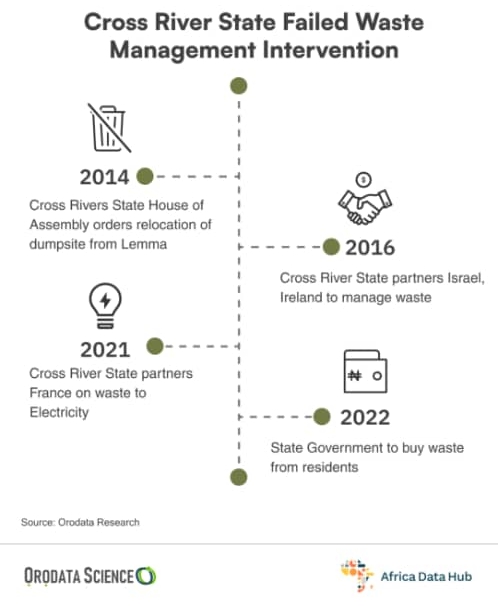
GuardPost sent a letter requesting an interview with the State Commissioner for Environment, Mfon Bassey. Mr Bassey, however, acknowledged receipt of the letter and delegated it to the Director General of Climate Change, who did not accede to an interview stating he has to get further clearance from the commissioner.
Calls were made and messages were sent to the verified phone number of Director General of Waste Management Agency, Sunday Oko, but he did not oblige us an interview.
Everyone is affected
Chief R B Otu, the Chairman of Lemna Community told GuardPost how bad the situation had gotten. “There was a time I was driving out for a meeting with top government officials and there was excreta and rubbish spilled all over the road. I didn’t have a choice, and I drove through with my car.
“My car was smelling, and the odor was so terrible. People kept asking, ‘Chief where are you coming from?’ I have never been so embarrassed in my life.” Chief Otu said.
Although the community reached out to Sunday Oko, the Director Waste Management Agency, and Mfon Bassey the Commissioner for Environment, the situation remained the same.
Chief Otu alleged that the two government officials refused to take or return his calls despite promising quick interventions in one of their meetings.
He confirmed that residents were more prone to malaria, typhoid and other vector-borne diseases. To top it off, the dumpsite had affected their boreholes, businesses and residences, because nobody wanted to live or work in an environment where the air is contaminated.
“The newly constructed NDDC road in the community is getting bad because of the number of trucks and caterpillars that ply the route daily. Lemna is an embarrassment to the state,” he concluded.
Taiwo Akinola, a pharmaceutical representative in Lemna, confirmed that residents of the area fall sick often.
“One of the major complaints we receive in our facility is that of malaria and typhoid, which can be attributed to the proximity of the dumpsite to residential homes. About ten to fifteen people come to the pharmacy daily for malaria and typhoid drugs, both young and old,” he said.
According to him, the cheapest malaria treatment plan cost between 750 and 1800 naira. Treating malaria every two weeks, especially for low-income households can be quite expensive.
He said the cost has made resident resort to using herbs and roots as alternatives which could be injurious to their health because untreated and mistreated malaria and typhoid is deadly.

Christian Ufot, who runs a local bar, complained that the dumpsite is affecting his business as customers do not feel comfortable drinking and eating in his bar because of the stench.
Agnes Ogar, a student at the University of Calabar, said she feels embarrassed about where she lives. “My house beautiful, no doubt, but how do I invite my friends from school to such an environment? This place gives me low self-esteem,” she told our correspondent.
What can be done?
The Country Director of Citizens’ Solution Network, Friday Inoyo, told GuardPost that the situation is very sad.
“We have seen a very careless approach by the government on the issue of waste management. Whenever I drive through Lemna, I feel very endangered because of the quality of air around that axis,” he said.
“Amid the calls over the years to relocate the dumpsite, many questions remain unanswered. Where will the government relocate the site to? What are the provisions for waste treatment in Lemna and the proposed new location?
“What the government has done over the years in Lemna and across the state is to endanger the lives of residents with its careless and unacceptable approach to waste management,” Inoyo said.
He urged residents to sustain the call for the relocation of dumpsites from residential communities to places that are not yet inhabited by humans while hoping for the government to invite the experts to tackle the situation.
Edem Edem, the National Coordinator of Green Concern for Development, an environmental non-profit operating in Cross River and other parts of Nigeria, said the dumpsite has been of grave concern.
“The methane gas emitting from organic waste in the dumpsite is very harmful to human health and the government must take immediate action to protect its citizens.
“The dumpsite is located on a hilly part of the community and the leachate from the site is seeping into the soil and contaminating the underground water.
“Thus means shallow boreholes in the area will be taking in most of this dangerous water and even the Lemna river will be affected as well,” he said.
According to Edem, it will take years to reverse the damage even after the dumpsite has been relocated.
While waiting for the government to do the needful at Lemna and also provide skip bins for areas in the state without them, residents of Calabar are encouraged to disposing waste indiscriminately.
On the other hand, residents are also calling on the Waste Management Agency and Ministry of Environment to evacuate refuse regularly to avoid the skip bins overflowing, faulty bins should be fixed or replaced and waste should be properly covered while in transit to dumpsites to avoid spillage on the road.
They also recommended that the number of contractors should be increased to ensure a seamless waste collection process.
This story was supported by The Africa Data Hub Community Journalism Fellowship

